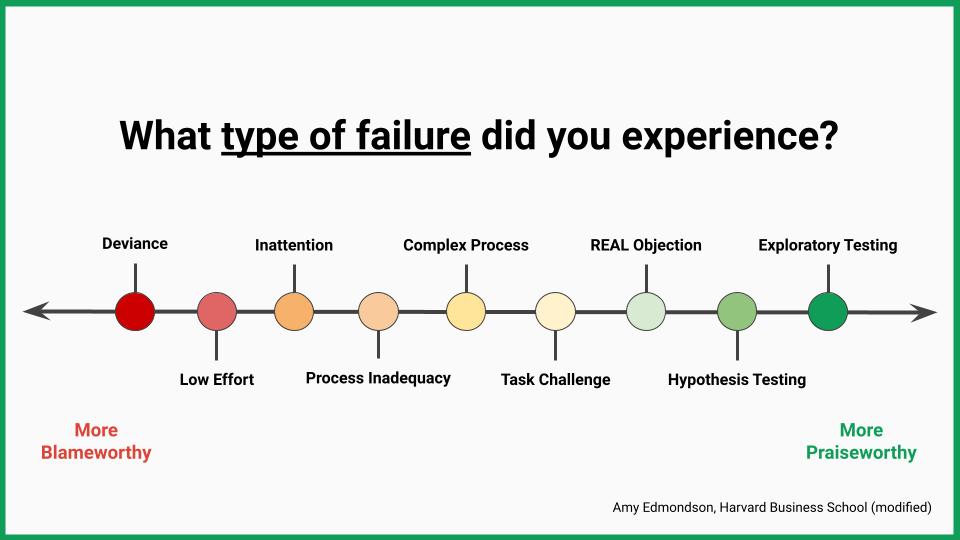Most salespeople I speak with need help learning to manage failure in sales.
Whether it’s the sting of being rejected during a cold call or the wave of fear, panic and anxiety following a lost deal; there is no questioning three truths about failure in sales:
- Failing hurts.
- Failing is scary.
- And failing is common.
To help you navigate this painful, scary and common occurrence – I’m going to share a key concept to help you manage failure and promote better Mental Health in sales.
But first…
Why does failure hurt so bad?
Professor Edmundson of Harvard, talks about how we first learn about failure and how much it hurts from a very early age.
As kids growing up – when we did something wrong, failed on a test or got blamed for a group not achieving its goals; we were introduced to difficult emotions like fear, shame, guilt, humiliation and ridicule.
These emotions mix together to create an extremely uncomfortable experience for a young child.
Rarely did our parents, teachers, and coaches acknowledge the emotions tied to failure. Nor did they teach us how to navigate failure effectively – often because no one ever taught them to begin with.
As a result, we walk away from these early childhood experiences learning:
Failure is bad and failure must be avoided.
These learning lessons become ingrained in our brain. They follow us into adulthood and along the way we pick up a slew of unhealthy coping mechanisms.
We obsess over outcomes and results. Aim for perfection through excessive control. And use bad habits or addictions to numb the pain of failure. When we do happen to cross paths with failure – we learn that we can blame others to deflect “feeling like a failure” onto another person or thing.
But this avoidance is a major mistake in our attempts to manage failure in sales, which stems from believing failure is bad.
Failure is not black and white, with failing being bad and not failing being good.
We all experience failure on a spectrum.

Enjoying This Post? Learn How to Thrive Under Pressure and Hit President’s Club
When we accept that all failures are not created equal, we can inject a healthy dose of compassion and curiosity into our lives. This means before you start playing the blame game or talking nasty to yourself after suffering a setback…
Pause and ask yourself:
What type of failure did you just experience?
Did you fail because you were being deviant, putting in low effort or not paying attention?
Failures in which you would be right to blame yourself and refocus your efforts.
Maybe your failure is somewhere in the middle of the spectrum?
Good intentions, effort and focus were all there – but you failed due to a process inadequacy; like your product was missing a key feature your buyer needed to complete the sale.
Or you failed because something went awry due to a complex enterprise sales process. Or you got rejected on a cold call because you’re new to sales and have yet to develop the skill-set you need to be successful at the task.
Less blameworthy types of failure that can help guide process improvements and skill development going forward.
Alternatively, maybe it was a failure that falls in the last part of the spectrum?
You experienced a failure in which you should actually be praised for.
Like successfully closing a client, but losing them shortly after due to a real objection or something happens outside your control during the sales process (i.e. budget cuts due to COVID). Or failing because you’re testing a new email template and exploring a new vertical to help your company find product market fit.
Praiseworthy types of failures you can feel good about. You successfully managed everything in your control and/or can walk away learning something new.
When we learn to manage failure and treat it like a spectrum, we set ourselves up to be successful.
It allows us to combat negative emotions like fear, anxiety, and shame, with strong positive emotions like curiosity, compassion and optimism.
Now operating from a calmer state of mind – failure evolves from something we fear, into a teacher we can learn from. By asking exploratory questions, we can analyze our failure to get better:
- Why did it happen?
- What did you learn from it?
- What’s one action you can take to prevent it from happening in the future?
So next time you experience a failure in sales, pause and take a deep breath.
Everything is ok.
Identify what type of failure you just experienced. And then spend time analyzing your failure so you can show up 1% better tomorrow.
For more best practices to help improve sales team performance through better Mental Health and Resilience; check out our virtual training options and guide by clicking on the Training button below.
Learn How to Thrive Under Pressure and Hit President’s Club
About The Author

Jeff Riseley is currently the Founder of the Sales Health Alliance and Mental Health Advocate. With over a decade of sales experience – Jeff understands the importance of Mental Health in achieving peak sales performance.
Jeff combines his sales and Mental Health expertise to improve sales performance through mental health best practices. His strategies have helped sales teams become more motivated, resilient and better equipped to tackle stressful events within sales.




